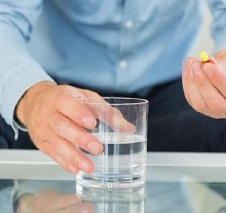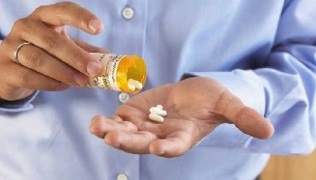
Prescribes antibiotics for chronic prostatitis to eliminate the bacterial factors that cause inflammation of the glands.
The purpose of antibiotic therapy is to relieve symptoms, prevent complications and restore normal prostate function.
Funds are prescribed by the attending physician based on the test results. The generic name "antibiotics" refers to several groups of drugs with various ingredients with obvious antibacterial activity.
Real antibiotics are substances of natural (natural) origin or their fully synthetic analogues.
Classification of chronic prostatitis
There are three main forms of chronic prostatitis:
- Chronic bacterial prostatitisis a prostate gland disease associated with the development of pathogenic microflora. Its symptoms are similar to acute prostatitis (pain during urination, pus and blood in the urine, etc. ), but the appearance is more vague (easy).
- Chronic non-bacterial prostatitisis a type of human prostate disease, caused by causes other than pathogenic bacteria (such as trauma or prostate stone formation), and is found in the presence of infectious diseases. However, the name of pathology only refers to the cause of the disease, not its course, because in the pathogenesis, the development of the same pathogenic flora as other types of prostatitis is noted.
- Chronic asymptomatic prostatitisis the pathology of the prostate glands caused by the pathogenic microflora in the prostate area, with no symptoms or almost no symptoms. important! If it is suspected to be found during the diagnosis based on the presence of pathological phenomena such as leukocyte urine and/or bacterial uremia, other diagnosis is required. This is because the course of chronic asymptomatic prostatitis is similar to that of prostate cancer.
Therefore, regardless of the type of chronic prostatitis, antibiotics are recommended in all cases. The medications used in designated treatment practices are discussed below. You first need to provide readers with a list of antibiotics for chronic prostatitis.
What antibiotics are there?
In recent years, the resistance of bacteria to certain drugs has increased sharply. Therefore, before starting antibiotic treatment for male prostatitis, it is necessary to check the entire STI group of patients and check the pathogenic flora to determine the pair of certain microorganisms. Resistance of certain drugs.
What antibiotics can be used to treat prostatitis at home? There are the following types of antibacterial drugs (the best antibiotics for male prostatitis):
- Penicillin.In the past, with the emergence of the most active antibacterial drugs, such antibiotics were actively used for prostate inflammation. Due to the increase in the number of negative bacteria resistant to penicillin, they actually lost their clinical significance.
- Macrolides.These antibiotics for prostatitis have a wide range of effects and low toxicity.
- Tetracycline.It has activity against Neisseria gonorrhoeae, Chlamydia and Mycoplasma. It is more commonly used to treat chronic infectious prostatitis caused by the above pathogens.
- Fluoroquinolones.Usually used for complex treatment of chronic inflammation of the prostate, as well as for acute simple prostatitis (up to 100% efficiency). They have high activity and low toxicity (they do not interfere with the intestinal flora).
- Cephalosporins.Actively used to treat acute forms of bacterial prostatitis. These are good antibiotics for prostatitis. They have a wide range of action and are highly active against pathogenic bacteria.

At the same time, modern medicine uses antibiotics for prostatitis or other diseases due to its function:
- quickly destroy the root cause of the disease and eliminate inflammation;
- The produced substance can kill or prevent the reproduction of bacteria and large viruses, but it is safe for the cells of large organisms;
- Works externally (suppositories, ointments) and other administration methods: intramuscular, oral, intravenous;
- Fight against multiple pathogens (broad-spectrum antibiotics) simultaneously.
What is the most effective antibiotic
To cure or reduce the symptoms of infectious prostatitis, please strictly follow the doctor's advice. After the doctor understands the nature of the disease, the treatment begins after the diagnosis. Self-treatment at home is fraught with devastating consequences and the human system malfunctions.
Antibiotic treatment recommendations
The side effects of antibiotics are as troublesome as worsening prostatitis.
Typical shortcomings of each group of drugs:
- Penicillin: skin rash, dermatitis, diarrhea;
- Cephalosporins: Diarrhea. Rash and fever are rare;
- Macrolides: nausea, vomiting. Colitis and cholestatic jaundice sometimes occur;
- Fluoroquinolones: abdominal pain, diarrhea.
Diarrhea is the most common side effect of antibiotics. There are two reasons for this: the imbalance of the intestinal flora and the overgrowth of bacteria called Clostridium difficile. Diarrhea can be prevented and eliminated by taking prebiotics and prebiotics at the same time.
Non-antibacterial therapy
In addition to antibiotics, the following treatments can also successfully treat prostatitis, especially chronic prostatitis:
- Prostate massage is the best way to improve blood circulation and discharge of inflammatory secretions in the prostate gland;
- Physiotherapy;
- Non-steroidal anti-inflammatory drugs-cannot be used simultaneously with fluoroquinolones;
- Herbal preparations;
- Alpha blocker.
In order to effectively cure the disease, it is necessary to perform a diagnosis to show the type of the bacterial pathogen that causes the disease in a specific patient and its sensitivity to the drug. Based on the results of the examination, the doctor decides what method to use to treat chronic prostatitis or the acute form of the disease.

























